 Andreas Bergthaler studied veterinary medicine at the University of Veterinary Medicine in Vienna and performed his graduate studies with Nobel Laureate Dr. Rolf Zinkernagel and Dr. Hans Hengartner at the Institute of Experimental Immunology of the University/ETH Zurich. After a postdoctoral stint with Dr. Daniel Pinschewer at the University of Geneva, he joined the laboratory of Dr. Alan Aderem at the Institute for Systems Biology in Seattle. In 2011 he became principal investigator at the CeMM Research Center for Molecular Medicine of the Austrian Academy of Sciences in Vienna, Austria. Andreas Bergthaler is the recipient of several awards including the Löffler-Frosch-Prize of the Society of Virology, the Georges-Köhler Prize of the German Society for Immunology, the Seymour and Vivian Milstein Young Investigator Award of the International Cytokine and Interferon Society and the Austrian Infection Research Prize of the Austrian Society for Infectious Diseases and Tropical Medicine. He is also co-founder of the clinical-stage company Hookipa Pharma (Nasdaq: Hook).
Andreas Bergthaler studied veterinary medicine at the University of Veterinary Medicine in Vienna and performed his graduate studies with Nobel Laureate Dr. Rolf Zinkernagel and Dr. Hans Hengartner at the Institute of Experimental Immunology of the University/ETH Zurich. After a postdoctoral stint with Dr. Daniel Pinschewer at the University of Geneva, he joined the laboratory of Dr. Alan Aderem at the Institute for Systems Biology in Seattle. In 2011 he became principal investigator at the CeMM Research Center for Molecular Medicine of the Austrian Academy of Sciences in Vienna, Austria. Andreas Bergthaler is the recipient of several awards including the Löffler-Frosch-Prize of the Society of Virology, the Georges-Köhler Prize of the German Society for Immunology, the Seymour and Vivian Milstein Young Investigator Award of the International Cytokine and Interferon Society and the Austrian Infection Research Prize of the Austrian Society for Infectious Diseases and Tropical Medicine. He is also co-founder of the clinical-stage company Hookipa Pharma (Nasdaq: Hook).
The immunopaedia ambassador, Maria-Bernadette Madel, was fortunate to interview Andreas Bergthaler. In the interview he discusses factors that contributed to his transition from veterinary medicine to immunology, and the current immunology research his research group conducts.
The Bergthaler laboratory unravels fundamental molecular mechanisms of infectious diseases (http://www.bergthaler1.at). Integrated approaches of virology, immunology, pathology and systems biology are coupled to experimental infection models to gain novel perspectives on host-pathogen interactions at the organ and organism level. This includes the multi-faceted role of type I interferons in immunoregulation and immunopathology (Schliehe C et al. Nature Immunology 2015, Bhattacharya A et al. Immunity 2015, Lercher A et al. in Immunity 2019). Recent discoveries focus on systemic immunometabolism and uncovered a surprising role of T cells in infection-associated cachexia and cytokine-induced metabolic rewiring of the urea cycle in the liver during infection (Baazim H et al. Nature Immunology 2019, Lercher A et al. Immunity 2019, Lercher A et al. Immunity 2020). Since March 2020, Andreas Bergthaler coordinates a large collaborative platform to investigate the mutational landscapes of circulating SARS-CoV-2 viruses in Austria (Project website: http://www.sarscov2-austria.org). This led to a recent study by Popa et al. published in Science Translational Medicine (https://stm.sciencemag.org/content/early/2020/11/20/scitranslmed.abe2555), which reconstructed superspreading events in Austria and achieved fundamental new insights into how SARS-CoV-2 acquires mutations and transmits within the human population.










